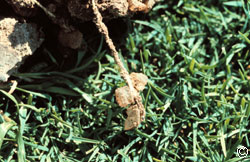Droughts have revived interest in the use of polymers as soil amendments for reducing the irrigation requirements of turf. The term “polymer” covers a lot of territory. The crystalline polymers promoted for landscape uses are most commonly either starch-based (which last about a year in the soil) or polyacrylamide-based (very long-lasting).
Does the use of polymers benefit a lawn?
A CSU field study on Kentucky bluegrass and tall fescue conducted in the early 90’s could find no advantage to using polyacrylamide polymers as soil amendments. They did not provide maintenance of green turf with the use of less frequent irrigation or lesser amounts of water, and did not delay the onset of dormancy when water was withheld. Further, dormant turf did not green up more quickly when watering was resumed. These findings held true even when very high rates were used. Municipalities, golf courses, and other users of polymers have generally reached the same conclusions regarding their effectiveness at water retention on turf areas.
polymers as soil amendments. They did not provide maintenance of green turf with the use of less frequent irrigation or lesser amounts of water, and did not delay the onset of dormancy when water was withheld. Further, dormant turf did not green up more quickly when watering was resumed. These findings held true even when very high rates were used. Municipalities, golf courses, and other users of polymers have generally reached the same conclusions regarding their effectiveness at water retention on turf areas.
Does aerating a lawn help with growth?
Some companies that market these materials for existing landscapes inject the polymer crystals into the soil. The injection equipment often does an admirable job of aeration and cultivation, leading customers to believe that the polymers are the reason for increased lawn quality. Regular soil aeration increases rooting and water infiltration. This enhances water use efficiency and ultimately raises lawn quality.
Can I use polymers in planters?
It should be noted that using crystal-type polymers in hanging baskets and in some container plantings can reduce the frequency and/or amount of watering needed to keep plants healthy, depending on the size, location, and type of container.
For more information, see the following Colorado State University Extension fact sheet(s).
For more information, see the following Planttalk Colorado™ script(s).



